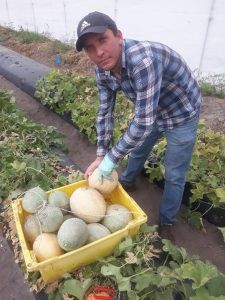Mar 6, 2023UF research uses UV light for powdery mildew on cantaloupe
University of Florida scientists want to help farmers in Florida and across the globe to fight a common cantaloupe killer: downy mildew.
Even with fungicides, producers struggle to control powdery mildew. Thanks to research at the University of Florida Institute of Food and Agricultural Sciences (UF/IFAS), growers may now use ultraviolet (UV) light.

Natalia Peres, a UF/IFAS plant pathology professor, has published a new study that shows UV light can zap the pathogen on the plants — without damaging them.
“Powdery mildew is one of the most common and severe diseases of cucurbits worldwide,” said Peres, a faculty member at the UF/IFAS Gulf Coast Research and Education Center (GCREC). “It can be a major disease on cantaloupes grown in Florida, although there are some cultivars that tolerate it better.”
In the Sunshine State, cantaloupe producers are largely in Collier, Hendry, Hardee, Manatee and Hillsborough counties. Florida farmers harvest cantaloupe from mid-March through May.
In its State Agriculture Overview for Florida, the U.S. Department of Agriculture’s National Agricultural Statistics Service shows that growers harvested 1,500 acres of cantaloupe in 2021. That’s about 375,000 pounds, worth just under $10 million. Nationally, growers produced cantaloupes worth $277.5 million in 2021.
Powdery mildew can survive natural UV light in sunlight. So, the disease can fight the natural UV light of daytime, but not at night.
“If we applied UV light during the day, we would need to use higher doses to get the same effect,” Peres said. “However, these natural defenses are not active at night, so by applying UV light at night, we can bypass the natural defenses of the pathogen and kill it with lower doses that we would need during the day.”
That’s why scientists put an ultraviolet lamp behind a tractor, drove it onto the GCREC research farm once or twice a week (overnight), pointed the light at the cantaloupe and struck the mildew out of the plant.
“Our unit was built in a shop by one of our strawberry growers,” Peres said. “Similar and bigger units could be designed and built for growers to use at their farms.”
No commercial units are available for field applications yet, but there is a lot of research recently on the use of UV light in agriculture systems.
Peres has already shown the UV light can work to suppress powdery mildew in strawberries, a $300 million annual crop in Florida. Her research using the UV light on strawberries caught the attention of a colleague of hers in Brazil.
She hopes these findings give a ray of hope to cantaloupe farmers across the globe.
“The UV light may be a practical approach to suppress powdery mildew in cantaloupe with the potential to reduce disease severity without damaging the plants or decreasing yield,” Peres said. “We are very limited in the number of types of fungicides available to control this and other diseases. Additionally, pathogens are acquiring resistance to some of these fungicides, so we need alternative methods.”
Included among the researchers who helped Peres with this research were Ueder Lopes, a professor at Universidade Federal do Agreste Pernambuco in Brazil; Galvin Alonzo, a doctoral student in the GCREC plant pathology lab; and Gary Vallad, a plant pathology professor at GCREC.
— Brad Buck, senior public relations specialist for UF/IFAS Communications
Photo: Ueder Lopes, a professor at Universidade Federal do Agreste Pernambuco in Brazil, helps harvest cantaloupe for the research project. Courtesy UF/IFAS
















